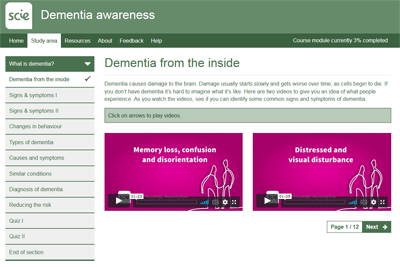This e-learning course aims to raise the awareness and skills of care staff who work with people with dementia. It aligns with Tier 1 of the National Dementia Training Standards Framework, which is a requirement for all staff working in social care. It will also allow you to collect evidence towards the relevant section of the Care Certificate.
The course seeks to improve the wellbeing and experience of people with dementia and of the care staff working with them. It should improve your confidence in managing situations you find challenging.

Course content
What is dementia?
Living well with dementia
Talking to people who are living with dementia
Learning outcomes
- Explain what is meant by the term ‘dementia’
- Discuss the signs and symptoms of dementia
- Differentiate dementia from other similar conditions
- Explain why early diagnosis is important
- Discuss what people can do to reduce their risk of developing dementia
- Explain what is involved in ‘living well’
- Discuss the importance of recognising what’s important to people
- Discuss how dementia affects the person, their family and our wider society
- Understand how to communicate effectively and compassionately with individuals who have dementia
- Understand why a person with dementia might show signs of distress
- Begin to respond effectively to people with dementia who have different communication needs
